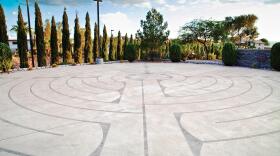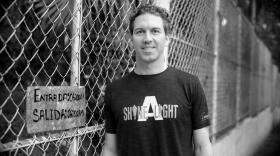Two poorly paid Las Vegas attorneys help immigrant children deal with America’s legal system — but the program may be doomed
Attorney-client privilege prevents Katelyn Leese from naming the El Salvadoran woman and children she meets at Las Vegas immigration court on a Friday in February, though she acknowledges that the transcript of the hearing is public record. The woman was one of nearly 22,000 worldwide Salvadoran asylum-seekers in the U.N. Refugee Agency’s most recent count. Leese, an immigration attorney in the Thomas & Mack Legal Clinic at UNLV, represents the woman's three daughters, ages 11, 12 and 13, who were among the 63,000 unaccompanied children taken into custody by U.S. Border Control between October 2013 and July 2014. The girls now face deportation.
Standing a few feet away from the mother, Leese says, “She has a good asylum claim.” She doesn’t elaborate, but the implication is clear. The U.N. agency's October 2015 report about the crisis of women and children fleeing Central America and Mexico described armed gangs terrorizing populations in order to take control of territories, targeting women in particular. The exploitation that children face on every step of their lengthy treks has also been well-documented in the media, perhaps most notably in the 2010 documentary Train to Nowhere.
Sitting in the linoleum hall of the immigration court, though, Leese’s clients look hopeful. The mother, a friendly 30-something, seems eager to show that she speaks English. The girls are fidgety carbon copies of the same child at one-year intervals: shiny black hair, jeans and knit tops, sweet smiles. Each wears one of the cartoon animal stickers that Leese handed out earlier and clutches a red folder full of paperwork for the hearing, which will decide whether they can be added to their mother’s asylum application, suspending the government’s removal case against them.
[[field:story]]
The five are summoned. Just before they enter the courtroom, Leese hands the 11-year-old a teddy bear dressed in a black robe and spectacles. In Spanish, she tells the girl not to be afraid. Inside, the judge, Munish Sharda, speaks gently to the girls through an interpreter, making sure they understand as best they can what’s happening. After administratively closing all three of their cases so that they can join their mother in seeking asylum, the judge tells them to keep in touch with Leese, follow her instructions, listen to their parents and stay out of trouble.
Outside the courtroom, there are relieved hugs, but the battle isn’t over. The U.S. grants asylum to only a fraction of the Mexican and Central American refugees who apply. Still, Leese is optimistic.
The family pays nothing for her services. Justice AmeriCorps funds the immigration clinic at the Thomas & Mack Law Center. But Leese and her partner in the clinic, Alissa Cooley, are worried that if they don’t find other funding sources soon, they won’t be able to close this and the other 93 cases they’re working on — or, worse, the program could end.
“We’ve built relationships and trust with these kids, and a lot of times, we’re the only stable figure in their lives,” Cooley says. “I’d feel bad walking away, handing them off to someone they don’t know.”
But she may have no choice; with limited funds and massive need, the program is rapidly becoming unsustainable.
It began in the late summer of 2014, with rising awareness of the brewing crisis over Latino immigrants fleeing dangerous circumstances, heading northward in search of safety. Law professors Fatma Marouf and Michael Kagan, who head the immigration clinic at the Thomas & Mack Law Center, got the Justice AmeriCorps grant to hire two attorneys for a special program focused on unaccompanied immigrant children. They hired recent Boyd School of Law graduates Cooley and Leese, who started taking cases in October of that year.
Who wouldn't want a job where you're fighting injustice and helping children?
Initially, with zero cases and a steep learning curve ahead of them, Cooley and Leese thought the $24,000 annual stipend per attorney seemed reasonable. They’d spend a year working in the high-intensity laboratory and then take their skills to another job where the salary was more in line with their education level. But they discovered that the cases, which have multiple parts involving different courts, take a long time to close. Meanwhile, the pent-up need for their services led to an explosion in clients, and the program operates on the principle of universal representation; no qualified applicant can be turned away, regardless of the merits of his or her case. Having spent two years mastering the system and learning the delicate art of communicating with traumatized children, Cooley and Leese now realize that finding another newbie — who’d be the only likely candidate to take such a low-paying job — to take over the massive case load they’ve built up is highly unlikely. And the program’s funding depends on at least one of them remaining on board.
“At the year mark, we hadn’t closed any cases,” Cooley says. “So, if I had left, Kate’s caseload would have increased. And they weren’t her cases from the beginning. So, I was like, ‘Okay, I’ll stay for a second year and try to finish as many cases as I can.’ But I don’t know if I can stay another year.”
Not that she — or Leese — wants to leave.
“Who wouldn’t want a job where you’re fighting injustice and helping children?” Leese says. “It’s a privilege to do what we’re doing.”
Privilege doesn’t pay the bills, however. Recently divorced, Leese is adapting to having full-time care of two dogs in a yardless townhouse and relying on credit cards for emergencies, such as a $1,300 repair to her 18-year-old Honda. Cooley also drives an 18-year-old Honda and says that, despite occasional side work writing criminal appeals for a local defense attorney, by the time her monthly check arrives, she sometimes has as little as $10 left in her bank account.
But they’re both loath to complain.
“It’s not that bad,” Leese says. “We’re not living below the poverty line. If you want to talk about sacrifices, let’s talk about the sacrifices the children have made to be here. They travel hundreds, thousands of miles, get kidnapped, raped on the way. All so they can live in a place where their lives won’t be at risk.”
In order for the program to continue, they say, they’d need enough funding to afford at least one more full-time staffer (they have one, a multipurpose receptionist/secretary/translator) in addition to higher pay for the attorneys. Leese says she’s applied for a grant from the Soros Foundation and that she and Cooley are researching other options, but the heavy caseload and extensive data reporting responsibilities required by AmeriCorps leave time for little else.
They hope to find a solution soon, but not primarily for their own sakes.
“We do this for the kids,” Cooley says. “It can be draining to sit in interviews and hear the horrible things they have been through. But I’m able to help them and make the best out of a terrible situation. They really need help. If we don’t do it, who’s going to?”














